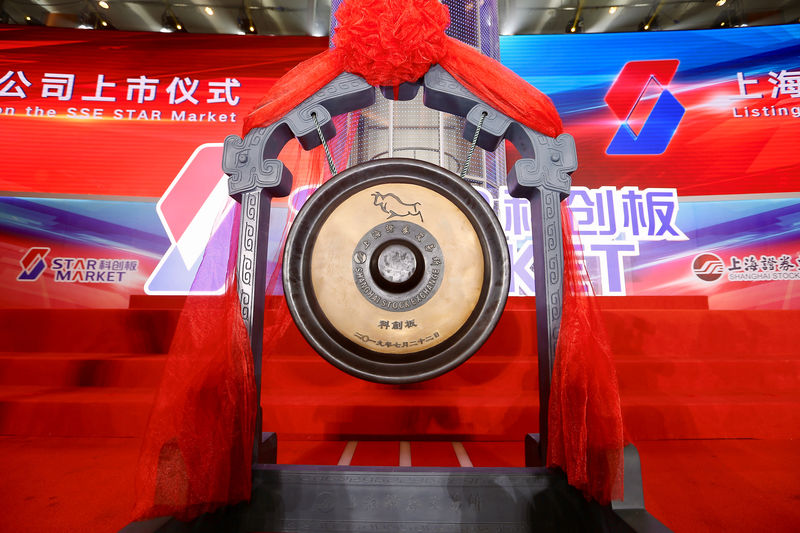By Luoyan Liu and Andrew Galbraith
SHANGHAI (Reuters) - As China's new Nasdaq-style tech board approaches the end of its first week of volatile trade, fund managers are offloading their holdings to hungry retail investors and locking in bumper profits.
Frothy valuations on Shanghai's STAR Market, which debuted on Monday, have also triggered short selling from Chinese traders betting that shares will fall.
The STAR Market's launch represents Beijing's boldest move yet toward a less-regulated market for initial public offerings (IPOs) and stock trading.
But looser trading rules, China's highly speculative investor community, and severe supply-demand imbalances have sent shares skyward, setting the stage for a sharp selloff.
"The price gains exceeded our expectations," said Liam Zhou, founder of Shanghai-based hedge fund house Minority Asset Management (MAM). "Such pricing represents extreme optimism in the market."
Taking advantage of STAR Market fever that sent shares surging as much as 520% on Monday's debut, MAM, which held IPO shares worth several hundred million yuan, has "sold a good portion" to eager buyers, Zhou said.
"We'll stand on the sidelines and wait for the market to cool down," said Zhou, a contrarian investor who embraces behavioural finance - the study of investor psychology - in his investment strategy.
According to exchange data, trading in the 25 STAR Market companies that listed this week - ranging from chip-makers to healthcare firms - totalled 48.5 billion yuan (£5.65 billion) on their debut, accounting for roughly 13% of turnover in all of China's stock markets, which include nearly 4,000 listed companies.
Retail investors did most of the buying, accounting for more than 90% of such transactions, while institutional investors, including fund houses and insurers, accounted for most of the sellers.
Mutual funds, which actively participated in STAR Market IPOs, appeared to be big winners. Scores of them saw their net value surge more than 5% on Monday. A fund managed by JX Asset Management led the gains, jumping 9.4%.
More than 80% of the IPO shares that have no lock-up period have changed hands on the STAR Market so far, said Peng Hai, an analyst at Lianxun Securities.
SHORT SELLERS
The scene has stirred memories of the frenzied launch of Shenzhen's now sluggish ChiNext (CHINEXTC) tech board a decade ago. On Monday, STAR stocks surged an average of 140%, much higher than ChiNext's 106% debut pop.
Short-selling demand and the limited supply of STAR Market shares available for lending has pushed borrowing costs up by as much as 20% on an annualised basis, compared with 8% for stocks elsewhere, traders said. Fuelling this are rules that allow investors to borrow newly-listed shares to sell for the first time.
Shen Shikang, a veteran trader who has been borrowing STAR stocks to sell, said current prices of many companies on the board have no basis in fundamentals.
On the STAR Market, short-selling transactions accounted for roughly 67% of margin buying, compared with 1.7% in the whole Shanghai market, according to calculations based on official data.
Many long-only institutions have sold the IPO shares they hold. And with such investors departing, investors are now bracing for a wild ride. Roughly 150 listing candidates are queuing up, potentially boosting supply.
China's retail investors "may overshoot in speculative buying and then feel betrayed if and when prices deflate," said Drew Bernstein, co-managing partner of accounting firm Marcum Bernstein & Pinchuk.
"The reality of investing in early-stage tech and biotech stocks is that not every business model pans out."
Some hope Chinese regulators can resist any temptation to interfere in the face of volatility.
"If the authorities take the new board's price swings in their stride, it will bode well for the long term liberalisation of China's stock markets," Thomas Gatley, analyst at Gavekal Dragonomics, wrote.
"If, however, the regulators move to damp down the market's volatility, it will indicate that Beijing's paternalistic, interventionist attitude to China's stock markets lives on."

($1 = 6.8748 Chinese yuan)